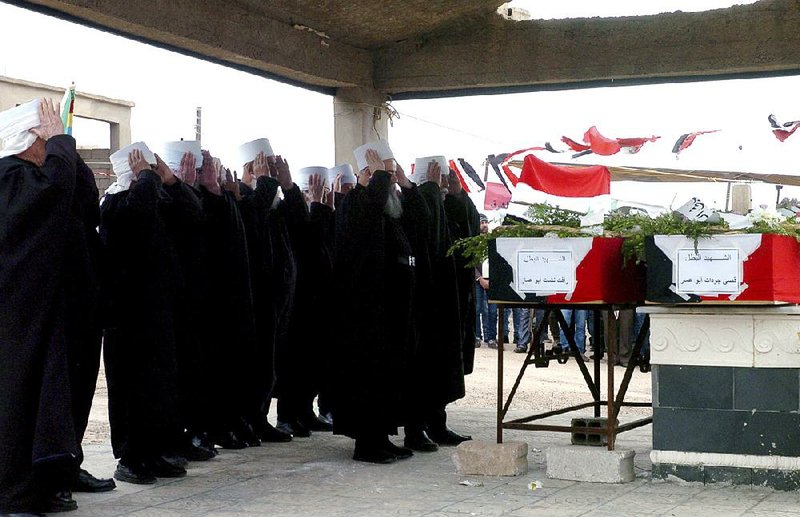DAMASCUS, Syria -- A Syrian woman captured by Islamic State militants said her 8-year-old son died in her lap after the extremists shot him and his cousin during a military operation to liberate them more than 100 days after they were kidnapped.
Najwa Abu Ammar, 35, was kidnapped with her two sons and daughter and nearly two dozen others in July from southern Sweida province in a bloody attack on their villages in which the militants killed more than 200 people.
When a military operation to free them began Thursday, the children panicked during the gunfire, she said. Her son Rafaat and his 13-year-old cousin Qusay ran and the militants fired at them.
"We were in the open air at the bottom of a valley as the clashes raged between the army and gunmen," she said. "When my son tried to run away, they [Islamic State militants] shot him. He was in my lap when he died."
His cousin bled to death after nearly five hours, Abu Ammar said.
"I am very very sad," she said in a telephone interview through a crackling line from her remote village of Shbiki. "I am tired."
A large funeral procession for the two children set out Saturday from the national hospital in Sweida to their village, about 18 miles to the east.
"What is the sin of those innocent children, who should now be in their classrooms," Monzer al-Shoufi, a resident of Sweida who took part in the procession, said by telephone.
The family of Abu Ammar suffered another loss in the kidnapping -- Rafaat's grandmother was killed on the day of the abductions.
Nashaat Abu Ammar, Rafaat's father, said his mother was among those kidnapped by the militants, who forced the elderly, sick woman to walk about 2.5 miles. When she failed to continue walking, they shot her dead.
The militants kept their own injured who fell while fighting with government troops in the hideouts with the hostages, another freed woman, Mashaal Saeed told reporters.
"Two days ago there were airstrikes and they suffered a lot. Many were injured and killed. They buried their dead while some lost their limbs. They put them right there with us," Saeed told reporters in a video posted online. "This really scared the kids."
Saeed said the captives also were held in a cave and in a desert area, before sleeping in a vehicle with a second level used as sleeping quarters.
The rare attacks in the province populated mainly by minority Druze included several suicide bombings. The violence on July 25 devastated the community and shattered the region's calm. At least 216 people were killed and the militants walked away with the captives.
Nashaat Abu Ammar said about 20 of those killed were close relatives and 60 others were related.
Najwa Abu Ammar said the captors held the group in different hideouts, including a camp and a cave, and once kept them in a moving car for more than 12 hours, the captives not knowing where they were headed.
The militants fed them sporadically and beat and insulted the children. They didn't torture them, Abu Ammar said, but started threatening to kill them as time passed.
At least two women and one man died in captivity, including a woman who was shot by the extremists to pressure authorities in negotiations for the captives' release.
Abu Ammar's husband said she looked frail.
"Sometimes they fed us once every two days and other times twice every day," Abu Ammar said, adding that meals were mostly just olive oil, thyme and jam.
"They held us first in a camp then a cave and kept moving us from one place to the other," she said.
Abu Ammar said she didn't know about the slain hostages until they were freed.
Six other hostages, two women and four children, had been freed in an exchange with the government in October. Negotiations were expected to free the remaining hostages, but talks failed and Syrian troops opened a broad offensive against Islamic State militants in southern Syria.
Separately, a war monitoring group and Syrian state media outlets accused the U.S.-led coalition of killing more than two dozen civilians in airstrikes in Hajin, a town in southeastern Syria near the border with Iraq, the Islamic State group's last stronghold.
Spokesman Col. Sean Ryan said in an email that the U.S.-led coalition "successfully struck [and] destroyed" an Islamic State observation post and staging area in Hajin "void of civilians at the time."
Ryan said the coalition team in charge of tracking civilians reviews claims of civilian casualties they see in media reports.
The Britain-based Syrian Observatory for Human Rights said at least 26 people, believed to be members of Islamic State families, were killed in Hajin and another seven were killed in Shafaa in airstrikes Friday. The Observatory said the dead were mostly Iraqi women and children.
Syria's state news agency reported 26 killed, quoting locals.
Information for this article was contributed by Sarah El Deeb of The Associated Press.
A Section on 11/11/2018

